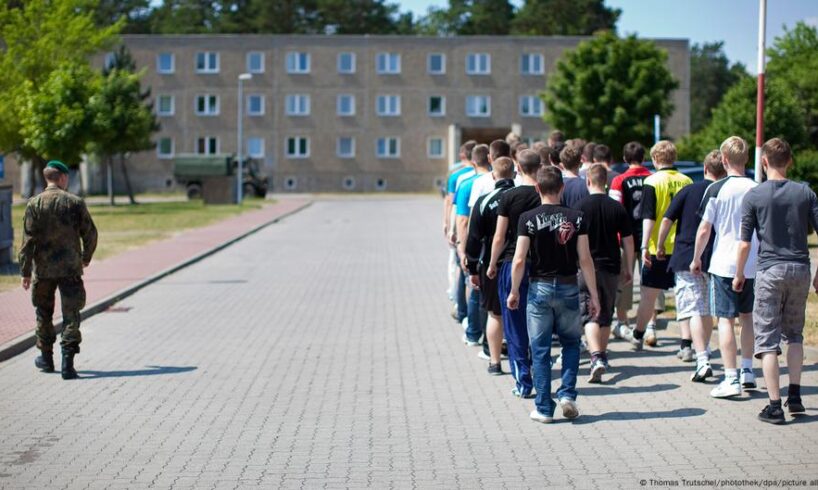
The German economy cannot cope with young people first completing mandatory military service, and only then entering the labor force, Steffen Kampeter of the Confederation of German Employers’ Associations (BDA) told the Financial Times. Are his concerns warranted?
Germany got rid of compulsory service in 2011, through strictly speaking, it was not abolished but merely suspended. This suspension may be lifted for national defense needs — should the country be threatened or under attack. Since then, young men must no longer undergo medical examinations to determine their physical fitness for military service.
But now, German Defense Minister Boris Pistorius has cautioned that Europe is facing a growing security threat. “According to the assessments of international military experts, it must be assumed that Russia will be in a position to attack a NATO state, or a neighboring state, from 2029 onwards,” Pistorius said last summer, speaking with the German daily Frankfurter Rundschau.
Pistorius has promoted a range of measures to address this threat, including a proposal that would reintroduce a kind of compulsory military service. These measures would strike a balance between the current model of voluntary military service and selective service.
Germany eager to strengthen its army
The German military, or Bundeswehr, currently has about 181,000 active personnel. Its ranks are set to grow by over 10% to 203,000 by 2027. The Financial Times reports that the German armed forces will need around 80,000 additional recruits over the next 10 years to meet its NATO commitments.
In June, Pistorius announced plans to introduce a hybrid model of voluntary military service and selective conscription. It would see approximately 5,000 18-year-olds conscripted for basic service each year. If there are not enough additional volunteers to fill all positions, a return to compulsory military service could follow, Pistorius told the German weekly Frankfurter Allgemeine Sonntagszeitung.
The minister’s proposed measures have been submitted to Germany’s parliament, where a decision is anticipated “before the 2025 summer recess.” The Defense Ministry has said “this should significantly improve the operational readiness of the armed forces.”
Just how voluntary is this?
Pistorius envisions a basic service that could have a duration of least six months, with a possible extension of up to 23 months.
“Everyone can decide for themselves how long they want to serve in the military,” his ministry stated on the matter. “Regardless of this, all other types of enlistment, whether as a soldier on temporary duty or as professional soldier, will continue to exist.”
The plan is to send a letter to all young people after their 18th birthday, with a QR code that would direct them to an online questionnaire. Those who complete the questionnaire and express a basic interest in serving will be invited for a medical examination. Young men will be required to complete the questionnaire, whereas for “women and persons of other genders, answering the questions is voluntary,” according to the Defense Ministry.
Pistorius’ plans to strengthen the army have received backing from President Frank-Walter Steinmeier, who told the public broadcaster ZDF that he was “in favor of compulsory military service.” Steinmeier said Europe’s tense security situation, Russia’s war in Ukraine and the US government’s stance on trans-Atlantic relations under President Donald Trump warranted the move.
The BDA’S Kampeter agrees with the assessment, and told the Financial Times he thought Europe’s “security situation is dramatic.” And while he also believes that Germany needed “more active soldiers and to strengthen our pool of reservists,” he said he felt that “only a strong economy can make that possible.”
German army needs more volunteers to fulfill NATO tasks
To view this video please enable JavaScript, and consider upgrading to a web browser that supports HTML5 video
Will conscription hurt the economy?
DW spoke with the German Economic Institute (IW) in Cologne to determine how justified Kampeter’s concerns were. “The effect of compulsory military service on the labor market depends on how many recruits are drafted, and how long they have to serve,” said economist Holger Schäfer. “Drafting 20,000 recruits is unlikely to have much of an impact, but drafting an entire age group certainly would.”
Schäfer did not want to give his opinion on whether compulsory military service was sensible or even necessary, but added that “naturally, security aspects play a major role in this question.”
The Bundeswehr currently provides opportunities for young people to complete vocational training in skilled trades and academic fields, such as mechatronics or medical professions. But Schäfer said this is unrealistic, given that basic military service is too short “to typically complete vocational training.”
The new conscription model under debate does provide possibilities for extending one’s service period, during which vocational training could be completed. This was the case when Germany had mandatory military service during the Cold War. This way, young people might enter the labor market later, but they would be fully trained, and able to counter the shortage of skilled workers.
Mandatory or voluntary service?
A study conducted last year by the Munich-based Ifo Institute, an economic research institution, found that it would be better to invest in voluntary military service than to introduce universal military service in Germany.
The study, commissioned by the German Finance Ministry, warned that compulsory military service would be expensive and have a negative impact on citizens. The Financial Times reported that mandatory service would worsen young people’s financial prospects by delaying the start of their studies or careers.
Carlo Masala, a professor of international politics at the Bundeswehr University Munich, meanwhile, believes concerns about the economic consequences of a return to any form of conscription are “exaggerated.” Even with compulsory military service, he expects that no more than 25,000 young people would be drafted each year — significantly fewer than the 200,000 West German conscripts drafted at the height of the Cold War.
Masala believes that the German economy has recognized “that it must engage in some positive way with defense questions” and that ultimately, it must “accept this.”
This article was originally written in German.





